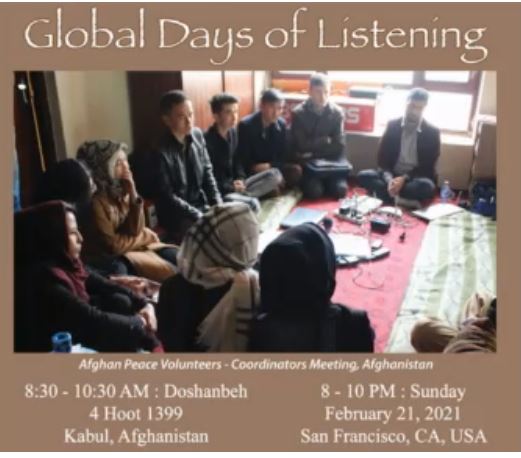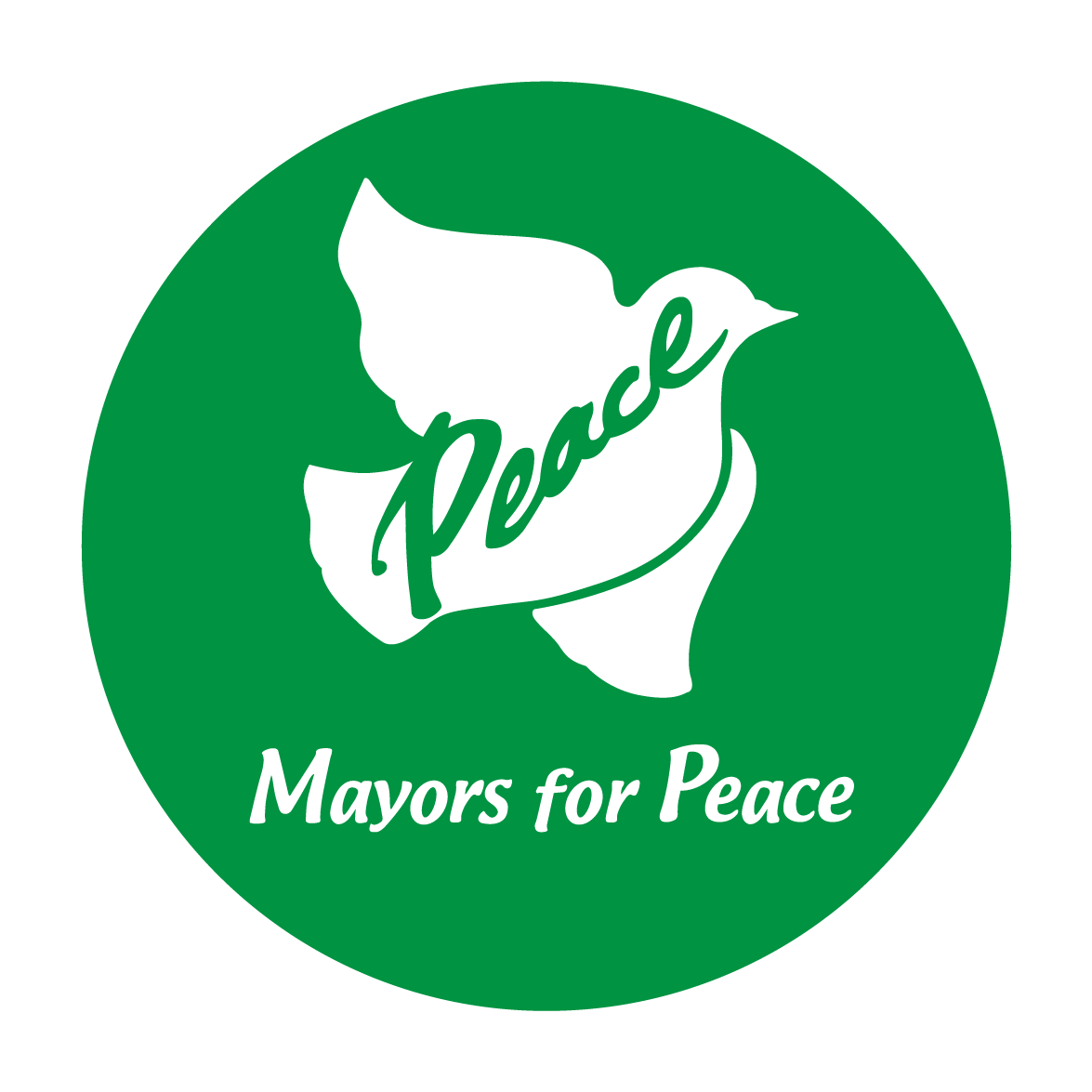Report by Ms. Jacqueline Cabasso, Executive Advisor for Mayors for Peace
On February 21, 2021 Mayors for Peace Vice-President Frank Cownie of Des Moines, Iowa and Mayors for Peace Executive Advisor, Jackie Cabasso of Oakland, California spoke via Zoom with a group of Afghan Peace Volunteers in Kabul and their supporters in China, India and throughout the United States. This was a session of the Global Days of Listening project of the Afghan Peace Volunteers, peace activists who are high school, university, and graduate students working for nonviolent solutions in their war-torn country. For more than a decade, the Afghan Peace Volunteers in Kabul have embraced a belief in nonviolence in the economy, in our relationships with the earth, in resolving conflicts, and in all other aspects. Each month they pose a question, and the international team invites guests who share their visions on the theme, followed by questions and dialogue.

The question posed by the Afghan Youth Peace Volunteers for the February Global Days of Listening session was “Do ‘nonviolent politics’ exist today? If so, how are they being practiced, or how could they be practiced?”
Mayor Cownie began by describing his personal history as a person looking for peace during the Vietnam War and reading the histories of World War I and World War II. “War is not the answer to the future of the human race,” he declared.
Mayor Cownie explained that as we look to make decisions at the local level, politics are out of it, race and gender are out of it, religion is out of it. “We serve all the people all the time at the local level. Whether their needs are public health issues, safe water, safe foods, how do we work together to make that happen?”
Mayor Cownie underscored that whether it’s war and peace, nuclear disarmament, or nuclear test bans, national leadership needs to hear from local governments, because the consequences of national actions or inactions often take place in the cities. “Just think of Hiroshima and Nagasaki,” he said. “Just ask those mayors if local government isn’t affected by the decisions made at other levels of government.”
Stating that “the youth are the future”, Mayor Cownie said we need to share our best ideas and practices, noting that they’re going to be a different in different places. “Whether it’s food sources, jobs, equity, education, we need to all work together to come up with solutions. And we need to share those ideas globally.”
He promoted Mayors for Peace and ICLEI (International Council of Local Environmental Initiatives) important channels for this work, highlighting ICLEI’s role is pushing forward the Paris Climate Accord. “I believe that it was local government that caused the Paris Climate Agreement to happen. We showed heads of State what happens and why we at the local government level support the engagement of all heads of State in the Paris Climate Agreement. Without that support, without Mayors going to their heads of State and telling them the consequences of not committing to that agreement, it would not have happened.” He noted that over 500 mayors from all continents were in Paris for the negotiations. “It was everybody coming together. We need to do that on all subjects, all of us working together and showing the local commitment and the need to work for peace and climate stabilization that are so imperative to the future of this planet.”
Mayors for Peace Executive Advisor Jackie Cabasso noted that growing up during the Civil Rights Movement in the United States, Dr. Martin Luther King, Jr. had a profound influence in shaping her thinking as a young person. “I have always been committed to nonviolence, but my understanding of nonviolence has expanded. It’s not just the absence of violence but a positive vision of peace with justice, with equality, with human needs being taken care of.”
Cabasso stated that at the national level it’s hard to think of examples of where nonviolent politics exist. The only exception is Costa Rica, which abolished its army and espouses nonviolence as a principle. “Unfortunately,” she explained, “in the most powerful states, including the United States, national security is defined in terms of projecting overwhelming military forced backed up by the threatened use of nuclear weapons.” But, she said, nonviolent politics at the local level come into focus.
Local leaders are working together at the international level through Mayors for Peace, ICLEI, United Cities and Local Governments, which is working to localize the United Nations Sustainable Development Goals, and Compassionate Cities. In the United States she identified Mayors for Peace, Mayors for Climate Protection, Mayors Against Illegal Guns, and Mayors for a Guaranteed Income. “All of these local authorities are working to implement the values of nonviolence to protect and make better the lives of their citizens. Our challenge is to move that vision from the bottom up to the national level.”
Cabasso underscored the critically important partnership at the local level between civil society organizations and local elected authorities. She explained, “This is how civil society organizations can maximize their impact by supporting progressive nonviolent local leaders like Mayor Cownie and helping them push their agenda up to the federal level.” She added that these ideas are just beginning to gain some traction in the United States. There is a new grouping in the U.S. Congress called the Defense Spending Reduction Caucus which is talking for the first time about fundamentally questioning what legitimate defense means and what legitimate national security means in non-military terms.
Mayor Cownie addressed a challenging question from one of the young participants in Kabul. Referring to Mayor Cownie’s initial statement that war is not a solution, he was asked what we can do to address terrorist or extremist groups who attack the government and the people.
His answer was that we need to understand terrorist groups and others who are seeking to undermine our forms of government. “They’re seeking power, not seeking equity; they’re seeking control. Part of our education and our future will be driven by all of us understanding the greater good when the needs of all, as opposed to the needs of the few are met.” He gave a few examples of what we can do in our own localities: thinking about food sources; what is healthy; how we raise healthy food; and looking at climate issues. “It’s all of us working together for that greater good and greater vision that will make a difference. It’s not going to happen through conflict and through war, but through collaboration.”
Mayor Cownie concluded by inviting the Afghan Peace Volunteers to ask their mayors join Mayors for Peace and ICLEI. Cabasso noted that there are currently three cities in Afghanistan that are members of Mayor for Peace, Herat, Kabul, and Nili. She explained that inviting more Afghan mayors to join would help Mayors for Peace meet its goal of 10,000 members.
In closing, Mayor Cownie recommended that the Afghan students read the book, “If Mayors Ruled the World.”
Unfortunately, the recording of this conversation is very poor quality, but a 5-minute video, A Brief History of the Afghan Peace Volunteers – YouTube, provides a fascinating introduction to this remarkable group of young people.
